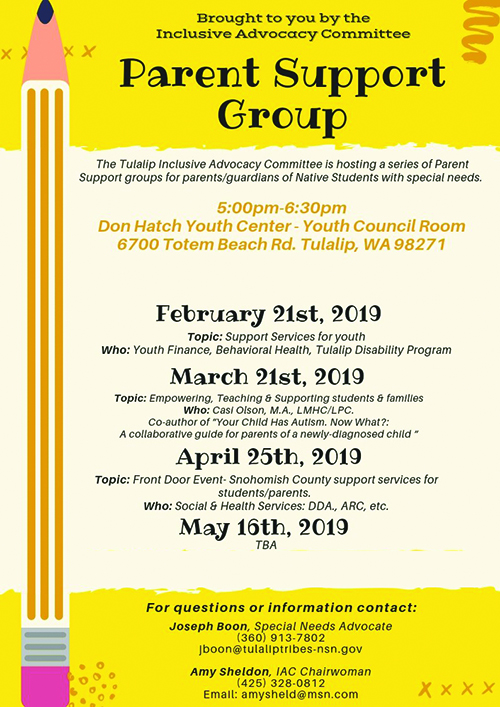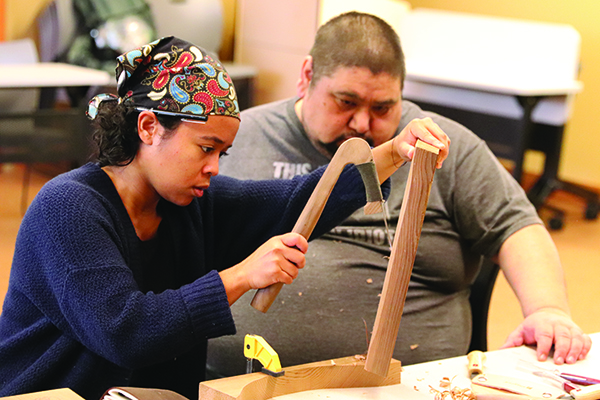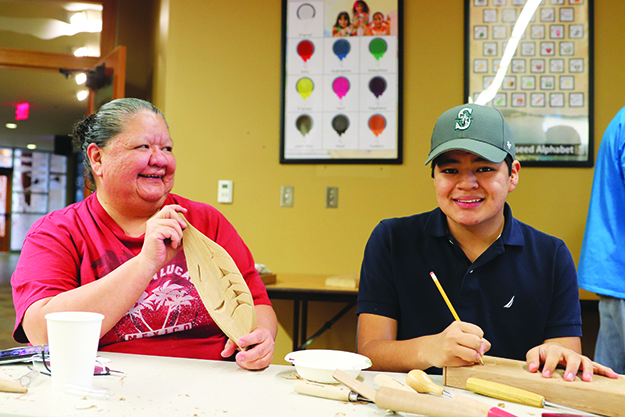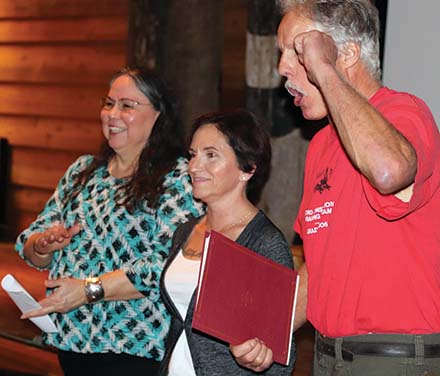Category: Education
Steven Madison is teaching traditional carving, and it’s cultural importance
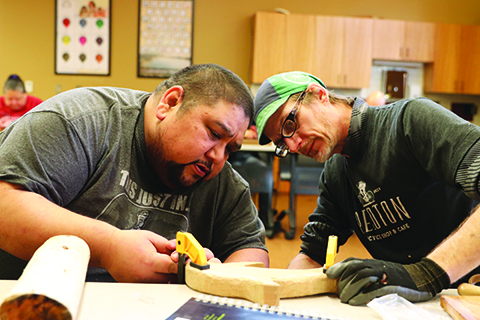
By Kalvin Valdillez, Tulalip News
The pleasant smell of freshly cut cedar floated out of classroom 2 of the Hibulb Cultural Center (HCC) on the afternoon of January 19, as a group of ten local citizens gathered for the center’s first Intro to Carving class. The museum enlisted longtime HCC collaborator and Tulalip Master Carver, Steven Madison, to teach the two-part culture series. Wood shavings fell to the floor while the group worked, constructing small projects and exchanging stories and laughter.
Each participant was challenged to learn the art of carving in an expedited fashion, picking up new tips and tricks throughout the two, three-hour courses. As Steven bounced about the room, personally assisting each student with their carvings, he introduced them to an assortment of tools such as the drawknife, a two-handed blade used to shape wood, and emphasized technique for safety reasons, constantly reminding the class to pay attention when sculpting their pieces. During the class, Steven carefully used a bandsaw to cut a whale design out of a block of cedar for one of his students.
One young lady needed assistance with an adze, a large axe-like tool with a sharp blade used for cutting and smoothing out large pieces of wood. He took a seat next to the student and placed a large slab of cedar on his knee, picked up the tool before advising with a chuckle, ‘don’t do this on your leg’ and began hacking with the adze as strands of wood flew all around him. All eyes appeared to be fixated on the master carver as he gave them a step-by-step tutorial on using the traditional tool.
“This all started with me simply wanting to teach people how to use the adze,” Steven recalls. “I did a carving demonstration here last year at the [HCC annual Salmon Bake Fundraiser]. During that demonstration, a lot of people were interested and asked their questions about my technique and the history, so I end up teaching them a lot about carving that day. After that, we decided we might as well do the carving class.
“This actually had a pretty good turnout. I really didn’t know how I was going to approach this series,” he admits. “Two, three-hour classes aren’t really enough time to get into depth with carving. So what I did with this class is I told them to go online and find a project they wanted to make, and let them know that we’re going to go all in, hands-on. Each of them chose a design; a salmon, the Tulalip whale, one girl is creating a carving with mountains and tress, like you’d see on a cedar basket. We just start carving wood and they’ve been learning as we go.”
The traditional art of carving has been passed down generation after generation. Amongst Coast Salish tribal communities, carving was important to the cultural lifeways of our people. The ancestors carved items for both ceremonial purposes and everyday use, sculpting canoes, paddles, rattles, masks, totem poles and even longhouses out of the spiritual cedar tree.
“I’ve always been interested in carving,” expressed young tribal member Khianna Calica. “With that being said, I had no idea where to start or how to get involved. I’ve come to other [HCC] events and when I saw this workshop on the events list, it was perfect timing. Prior to this, I have never touched any carving tools and with the two classes I feel more comfortable with the execution. I came to the workshop today because I think that events at the cultural center are a phenomenal way to preserve the old medicine and the traditional arts and craft. We have to participate. If the knowledge keepers are willing to be here, people need to show up. I found it really important for me to show up and invite these traditions in my life, it’s so healing.”
Steven believes this series is an ideal way for beginning carvers to get familiar with the tools and technique. His partnership with the museum extends throughout the course of this year, hosting another Intro to Carving class before starting an in-depth six-week course in the late summer where students will craft paddles and spindle whorls.
“The reason we’re doing this is really because we want to keep this alive forever,” states Steven. “That’s why it’s always so good to see the younger generations learning. A lot of kids want to learn but don’t necessarily have the patience for it. I’m one of few people who learned from my grandfather [Frank Madison] and Bernie Gobin. There’s a lot of great carvers, but those are the ones I learned from. There are so few of us left who know the technique of the old ways and the reason why we carve. You can go to anybody to learn how to carve a totem pole, it’s not rocket science, but the reason we do it is because each carving has a point and there’s a story to each one.
“Carving is so important to our people. It was almost gone before [William] Shelton carved his story poles at a time when they were prosecuting people for carving and practicing traditions. Carving was passed down from my grandfather to my uncle to me and now I’m teaching that to the upcoming generations who want to learn.”
For further details about the Intro to Carving classes, please contact the museum at (360) 716-2600.
Tulalip Resort Casino Blackjack Training, begins March 4
TVTC recruiting for upcoming class, January 28
Share your story: Poetry at Hibulb
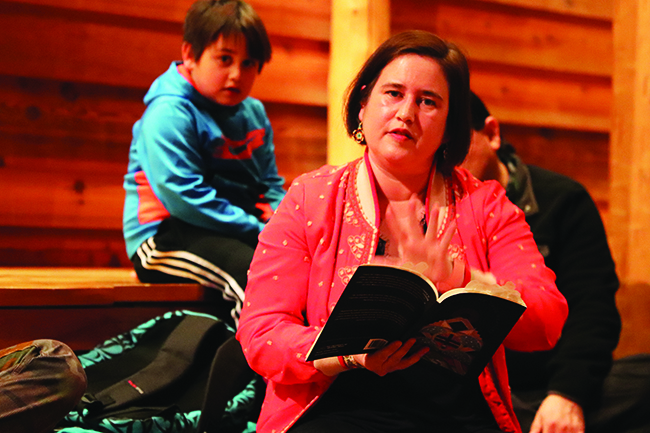
By Kalvin Valdillez, Tulalip News
As far back as many can recall, long before precontact times, Indigenous Peoples used the art of poetry to engage their communities and convey important life lessons. Through stories, the younger generations learn how to navigate through their journey and avoid some of the many pitfalls life has to offer.
Poetry has always been a way to cleverly portray a story, rhythmically using words to paint vivid pictures into the audience’s mind. Traditionally, poems were crafted as blessings to the creator and countless storytellers throughout time used poetry to explain how Mother Earth came to be, with such verses describing the raven stealing the moon and tossing it into the sky. And across the world, generation after generation, romantics relied on the expressive art form to win the hearts of their main attraction.
Once a month, the Hibulb Cultural Center hosts a poetry series inside of their longhouse where local Indigenous poets are featured and invited to share their words with the community. The series provides a space where creatives can tell their story and explain the thought behind each of their readings, while listeners delve into the deeper meaning, paying close attention and hanging onto every word.
“Tulalip elders were the foremost poets in our area,” says Hibulb Cultural Center Education Curator, Lena Jones. “Our ancestral language itself is rhythmical and expressive. When one translates the elders’ words and wisdom from Lushootseed, the words contain profound meaning expressed in a beautiful way. Our elders tell us that the ancestral elders advised us to use words as medicine for the people.
“Hank Gobin,” she continues. “The first director of the Hibulb Cultural Center and himself a talented poet, included poetry as one of the objectives of the Center, feeling poetry was becoming a lost art.”
On the afternoon of January 3, Shawnee tribal member and renowned Indigenous Poet, Laura Da’ read poems from her most recent book, Instruments of the True Measure, the follow up to the critically acclaimed, Tributaries. During Hibulb’s first poetry series of the year, she explained that she created fictional characters to tell the true story of the relocation of the Shawnee people.
“I see them [my books] as part of the same art, they definitely go together,” says Laura about her publications. “They both have a sense of going back and forth from the history to the present time and kind of wobbling along that line and taking the linear piece of time out. Mostly they [show]how the past impacts the present, particularly for Shawnee people and how the history informs how we live today and how knowledge of it can gives us more strength, but also understanding of our conflicts within our own nation. Knowing what my own ancestors have gone through is helpful to me to know how to interact with challenges today.”
Poetry is an essential art within many cultures and has led to modern day music and film. To Native American culture specifically, poems are integral to many tribal communities’ way of life. Since the years of forced relocation and assimilation, contemporary Indigenous writers use poetry to speak about important issues and accurately recount the colonization era that is far too often romanticized in U.S. History. While displaying incredible resiliency, the poets give insight to rez life, coping with generational trauma as well as many other issues happening across Native America.
“Poetry is the way I love to write best because I like that it allows a lot for the unsaid,” Laura explains. “I feel that it gives you time to sit with difficulty and also with beauty but it doesn’t tell you what to do with it. It’s a meditative kind of writing and I like to do it because it’s so difficult. It makes you notice things so much as a person. You work so hard to get the line, the image and the rhythm, you create a relationship with words that ebbs back to an original appreciation of what it means to say something.”
The one-hour poetry series allows the featured artist to express their words for approximately half-an-hour. The floor is then opened up for fellow wordsmiths to share their poems and ideas with the people.
“Poets such as Laura Da’ bear historical witness to the strength of the Native American spirit and inspire appreciation for the diversity of the American experience,” states Lena. “Others, such as Tulalip tribal member Sarah Miller, a poet and Lushootseed Language teacher, illuminate Tulalip’s vibrant cultural legacy. Sarah will be the featured poet on February 7. The open mic portion of the poetry series brings an endless source of wisdom and imagination, often times humor, and quite often meaningful dialogue to the Tulalip experience and current social issues.”
In recent years, poetry has seen a huge resurgence within tribal communities. More and more youth are reciting original words that reflect their perspectives while tackling issues that they witness on a day-to-day basis including suicide and drug abuse. Laura encourages young Indigenous writers and artists to pursue their dream and continue creating. She also urges young Native women to use their talents as a tool to heighten their voice, expressing that stories about Missing and Murdered Indigenous Women, as well as domestic and sexual assault, need to be heard.
“My main piece of advice is, seek and cultivate your community,” she says. “Use your writing to enhance your friendships, use your writing to talk to your elders and listen to them while honoring your voice too. For young Indigenous writers, know how much we need your story.”
The next Hibulb Cultural Center Poetry Series will be held on February 7. For additional details, please contact the museum at (360) 716-2600.
Twenty-three students celebrate TERO graduation
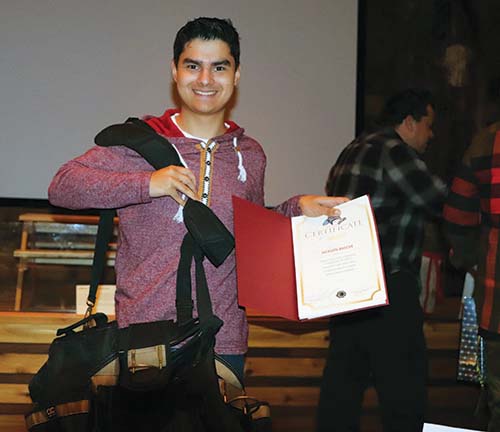
By Kalvin Valdillez, Tulalip News
“It feels great,” says TERO Training Vocational Center (TVTC) graduate and Tulalip tribal member, Joseph Henry. “It’s a blessing to be a part of this program. It gives us a lot of opportunities, opens many doors for us. It’s the stepping stone of where we want to go. What I learned from this program is to be humble, utilize all your tools. It gives us a career, more than just a temporary job. I have several trades that I wouldn’t mind pursuing, cementing, masonry or carpentry, that really caught my eye. The goal is to build my own house one day. We’ve gained so much skills, it’s really an honor to be Native and take part in a program like this.”
TVTC is a hands-on learning experience that trains Native Americans, from all tribal nations, and their family members in the construction trades. During the sixteen-week course, the students learn several skills that they can apply at a variety of well-paying jobs including carpentry, cementing, plumbing as well as electrical and mechanical work. In addition, they also earn their flagging, first aid and safety certifications.
TVTC is well known throughout the nation and has welcomed Indigenous Peoples from many tribes. It is one, if not the only, Native pre-apprentice program in the United States. Most recently, the training center began adding new vocational trainings for their students such as marine technology and medical pre-apprenticeship.
On the morning of December 17, friends and family of twenty-three TVTC students gathered at the Hibulb Cultural Center longhouse to witness their loved ones graduate from the program.
With fifteen Tulalip graduates, seven graduates from other tribal nations and one Tulalip spouse, this latest graduating class saw a whopping twenty-two students complete the construction program and one student successfully finish the medical apprenticeship program. TERO strives to provide ‘training for a better tomorrow’ by teaching tribal members how to work with their hands, giving them the tools and foundation to build a new future for themselves.
“Our construction students did sixteen weeks of intense training,” explains TERO Director, Summer Hammons. “That’s five hundred and sixty-hours and twenty-eight college credits. They’re walking away with OSHA (Occupational Safety and Health Administration) training, forty-hours of HAZWOPER [Hazardous Waste Operations and Emergency Response] training, forty-hours of scaffolding, flagger certification, CPR/First Aid training and boom, scissor, and fork-lift certification.
“Our medical apprenticeship program, we started at our health clinic,” she continues. “It’s about a year-long and we worked with the Washington Association of Community and Migrant Health Services. They do forty hours a week, completing a 2000-hour apprentice program in the medical field, requiring additional online classes, ten to fifteen hours a week, plus three Saturday, full-day clinical workshops. And bringing the cultural element, we’ve also brought a new aspect called marine technology and that’s working with the waters and the fishing component, so that our students can learn how to fabricate their boats and work on their engines.”
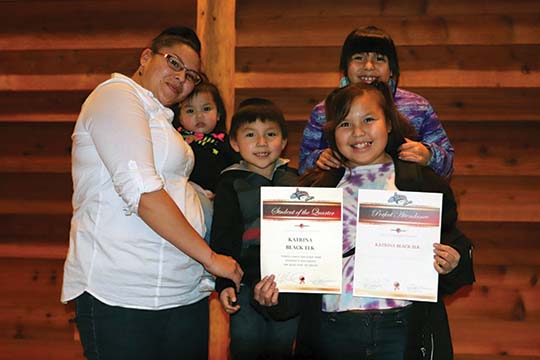
The TVTC participants work on a number of projects throughout the course, all while developing important and necessary skills like time management, finance and resume building. The program is largely based on creating a brighter future for tribal families. Therefore, TVTC puts a special emphasis on including the families throughout their loved one’s journey, hosting fun family nights and providing a number of resources for children, to parents who are enrolled in the classes.
As the graduation ceremony continued, the students received their diplomas as well as a tool belt they can put to use once they’ve landed their first job. Upon receiving their certificates, it was easy to see that each student shared a unique connection with their instructors Mark Newland, Billy Burchett and Lisa Telford.
“When I first started I wasn’t sure if I would complete it because my whole life I’d quit things before finishing,” expresses Tulalip tribal member and TVTC grad, Rose Runningwater. “Lisa pushed me really hard to do this for myself. I completed this class because I wanted it and I realized that because she pushed me. It was a really good experience and I know today that I’m a woman who can spread my wings, fly and get what I want out of life.”
Many students offered hugs and even shared a few words of appreciation about their teachers, gifting them with items such as paddles and blankets.
“I can’t describe it; it makes me want to well up right now,” says Mark after receiving a beautiful Eighth Generation wool blanket. “I’m so humble, I just try to pass on what I know to the people of my community. We had a large class – lots of strong personalities, leaders and also six strong women to help out. We built four tiny houses that will be utilized here in Tulalip and we also built some looms for this museum that are on display right now. It was a really fun class and I’m excited to see where this will take them.”
Committing to a program that takes months to complete is no easy feat by any means. Although a majority of the class lives locally, a handful of student’s live hours away from Tulalip and made a long-distance trip every day, including Warm Springs tribal member, Nalani Brisbois, who lives nearly one hundred miles away in Nisqually. By befriending fellow classmate and Colville tribal member, Annette Squetimkin, Nalani fortunately did not have to make the entire commute alone.
“I would wake up at 3:30 every morning, get ready and hit the road by 4:30,” Nalani says. “I’d stop in Tukwila and pick up Annette and we’d get here around 7:30. It was kind of hard – early mornings every day. Sometimes I didn’t want to come back but I kept at it and I’m happy because it was really worth it.”
Puyallup tribal member, Sandy Dillion, can relate to his classmates as he had early mornings as well and would return home late evenings after traveling through stop-and-go traffic, taking away much needed family time from his wife and kids.
“It was pretty tough,” he says. “Waking up at 4:30 in the morning and having to leave the house at 5:05. It was worth it for me though because just thinking about it, in the long run, driving this far every day to make some money in my future is definitely going to pay off. Our TERO department [in Puyallup] is not as big as this one, so for them to reach out to other tribal members to get them educated and started on a career path is important. I’m really appreciative of this opportunity and I want to thank the Tulalip Tribes.”
Several union representatives were in attendance, looking to introduce themselves and recruit new employees. The TERO department recognized two local construction business owners, Chris Winters and Gordy Sansaver, who acted as liaisons, assisting TVTC graduates find work throughout the years. Many TVTC Alumni sat amongst the crowd, supporting the new graduates. Alumni took a moment to share their success stories and experiences with the program, encouraging other tribal members to consider a career in the trades.
“If you have any interest at all, come sign up,” said Mark. “You’ll find out that working with your hands, working outside and building a future is for you because the rewards are tremendous. The Tulalip TERO program has paved the way for so many students. It’s there for the taking, you just have to reach out and put your mind to it and go for it.”
The TVTC pre-apprentice construction program is accredited through Renton Technical College and South Seattle Community College and is funded by the Tulalip Charitable Fund and the W.K. Kellogg Foundation. There is no cost to enroll in the apprenticeship and the program comes highly recommended from previous students.
For further details regarding the TVTC program, please contact TERO at (360) 716-4747.
December’s students of the month
By Micheal Rios, Tulalip News
Marysville School District’s very own Equity, Diversity, and Indigenous Education department created the Student of the Month awards to recognize outstanding students who have demonstrated commendable academic success in the classroom. Student awardees in the past have displayed an admirable dedication to their school work and active involvement amongst their peers.
Previously, only one girl and one boy student were honored, but the program has grown to include one impressive student from each of the elementary, middle, and high school levels. For their commitment to excellence in the classroom and backed by strong recommendations from school faculty, Dakota Laducer of Quil Ceda Tulalip Elementary, Devaney Jones of Totem Middle School, and Keyondra Horne of Marysville Getchell High School were announced as students of the month for November.
The three students, all Tulalip tribal members, received special recognition and were given a commemorative certificate during the Marysville School District’s school board meeting held on Monday, December 10.
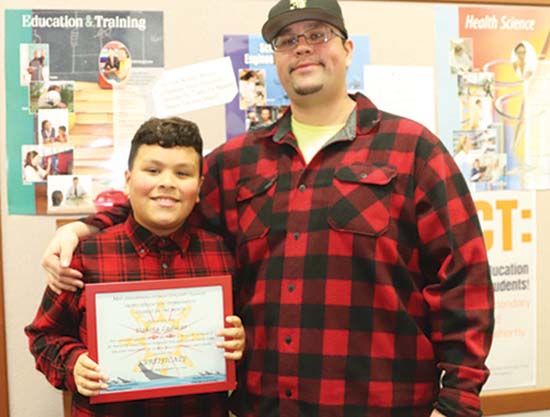
Indigenous Education Liaison Breezy Distefano introduced Dakota to everyone in attendance. “Dakota has shown so much perseverance in his learning, and tries to learn something new every day,” she said. “He has recently increased his testing scores by over 200 points, which is a huge accomplishment.”
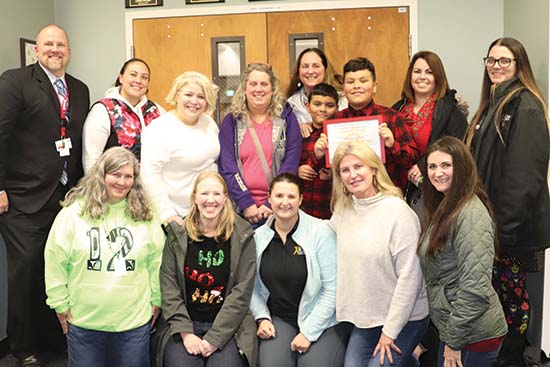
Dakota accepted his award with a large ovation from the crowd as many Quil Ceda Tulalip teachers and administrative staff turned out to support the young man’s academic milestone.
Principal Douglas Shook explained, “We are absolutely proud of Dakota and the growth he has made as a student, but also as a leader. He is one of our students that embodies the growth spirit we have at Quil Ceda Tulalip. We have a lot of staff that are rooting for his success.”
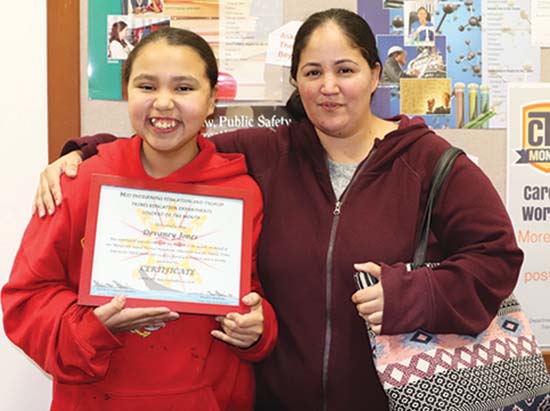
Next up, 8th grader Devaney was described by Native Liaison Terrance Sabbas. “Devaney is an amazing student who has top notch grades and is a great role model for all Totem students,” he said. “Talking with Devaney’s teachers they said she’s an incredibly hard worker, is very respectful, and has shown tremendous writing skills. What I enjoy most about Devaney is she takes her job as a student seriously and wants to achieve as best she can.”
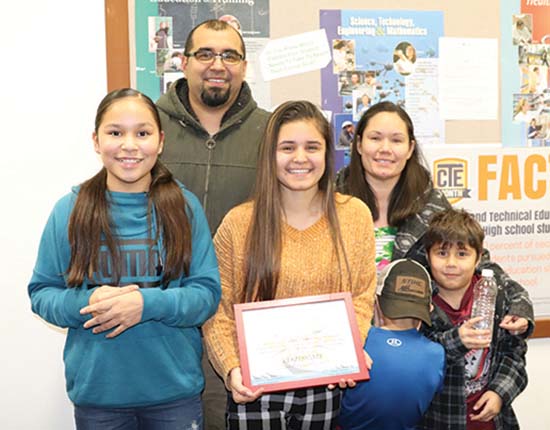
High school student of the month honors went to Getchell High School student standout, sophomore Keyondra Horne. “She has a 3.75 GPA and has only missed one day of school this year, so that is so awesome what she’s been able to achieve with her academics and attendance,” described Lead Indigenous Education Liaison, Matt Remle. “Not only is she succeeding in school, but even more astounding she is highly involved and engaged with her traditional culture. Keyondra is a fancy dancer in the Powwow circuit who reigns as a Princess for the Stillaguamish Powwow. She’s also been selected as a leader of her peers to be head-woman dancer for the upcoming MSD Christmas Powwow. No doubt, she will succeed in her post high school endeavors where she wants to go to college and major in Accounting.”
Going forward, a selection committee will review all student nominations based on their academics and school engagement. Each month three students (representing elementary, middle and high school levels) will be recognized as students of the month. For more information or to nominate a student, please contact Director of Equity, Diversity & Indigenous Education, Deborah Parker at 360-965-0059.
Why study of criminal justice?
Submitted by Jeanne Steffener, Tulalip Tribes Higher Ed
The study of criminal justice covers all areas of the justice system. This includes detection of crime through the arrest phase, trial, sentencing and treatment and eventual release of the offender. Other goals include rehabilitation of offenders, prevention of other crimes and moral support for victims. The primary institutions of the criminal justice system include the police, prosecution and defense lawyers, the courts and prisons. The criminal justice field covers a large variety of career and interest options for potential students to explore.
A four-year degree in Criminal Justice should emphasize a focus on social justice, diversity, community partnerships, systems thinking and skill development. A social justice lens should be adopted with more focus on harm reduction and rehabilitative and restorative approaches to crime and justice. This shift in focus can lead to a reduced rate of recidivism in previous offenders.
 Many occupations today require college educated applicants having these skills: strong communication, ability to problem solve, critical thinking, leadership, and ethical decision-making. The (BLS) Bureau of Labor Statistics projects a 19% growth in employment in crime investigation and 12% increase in private security jobs in the future. This increased growth and the increasing numbers of baby boomers reaching retirement age ensures that law enforcement agencies will continue to hire qualified criminal justice professionals. The graphic of criminal justice careers to the left lists 32 different careers that are involved in the criminal justice field. Many positions in this field are both physically and mentally demanding, so a student is more likely to succeed if they have a genuine interest in both the law and the justice system. The criminal justice field rewards specialization and persistence and can also lead to fulfilling and well-paid careers.
Many occupations today require college educated applicants having these skills: strong communication, ability to problem solve, critical thinking, leadership, and ethical decision-making. The (BLS) Bureau of Labor Statistics projects a 19% growth in employment in crime investigation and 12% increase in private security jobs in the future. This increased growth and the increasing numbers of baby boomers reaching retirement age ensures that law enforcement agencies will continue to hire qualified criminal justice professionals. The graphic of criminal justice careers to the left lists 32 different careers that are involved in the criminal justice field. Many positions in this field are both physically and mentally demanding, so a student is more likely to succeed if they have a genuine interest in both the law and the justice system. The criminal justice field rewards specialization and persistence and can also lead to fulfilling and well-paid careers.
In a 4- year criminal justice program, you will learn to write reports, take fingerprints and document crime scenes. Your course work will cover a broad range of criminal justice topics including learning effective communication skills and professional ethics. Many organizations such as federal agencies (DEA, FBI and CIA), normally require at least a bachelor’s degree. More advanced education will help you to stand out with potential employers while increasing your ability to advance to a supervisory or administrative position.
There is always a demand for knowledgeable professionals to protect our country and its citizens, due to the risks to the public’s safety. If you have perseverance and determination, you will more than likely enjoy a long and fruitful career in an area that is relatively immune to the ebb and flow of the private sector job market.
The most compelling reason to pursue a degree in criminal justice is the opportunity it gives you to help other people. So if you are interested in investigating this field of study, please call the Higher ED staff at 360-716-4888 or email us at highered@tulaliptribes-nsn.gov for assistance with this educational path.
November’s students of the month
By Micheal Rios, Tulalip News
Marysville School District’s very own Equity, Diversity, and Indigenous Education department created the Student of the Month Awards to recognize outstanding students who have demonstrated commendable academic success in the classroom. Student awardees in the past have displayed an admirable dedication to their school work and active involvement amongst their peers.
Previously, only one girl and one boy student were honored, but the program has grown to include one impressive student from each of the elementary, middle, and high school levels. For their commitment to excellence in the classroom and backed by strong recommendations from school faculty, 3rd grader Leah Stacy of Kellogg Marsh Elementary, 8th grader Hudson Reyes of Cedarcrest Middle School, and 9th grader Jaycynta Myles-Gilford of Heritage High School were announced as students of the month for November.
The three students, all Tulalip tribal members, received special recognition and were given a commemorative certificate during the Marysville School District’s school board meeting held on Monday, November 19.

Special Education Liaison Amy Sheldon introduced Leah to everyone in attendance. “Leah is an amazing little girl and works very hard on her school work,” said Amy. “She has made significant academic growth. In fact, over the last year Leah has made a tremendous jump in her reading skills.”
Leah’s teacher Ms. Whitfield added, “Leah is becoming a wonderful citizen at school and is so kind and polite to others. She works hard through so many challenges and doesn’t give up until she accomplishes what she needs to.”
Next up, 8th grader Hudson was described by Native Liaison Terrance Sabbas. “We’ve noticed a lot of growth from Hudson this school year, especially with his improved attendance. His grades have gotten a lot better, but most importantly as an individual he has matured into a very respectful and awesome person to be around.”
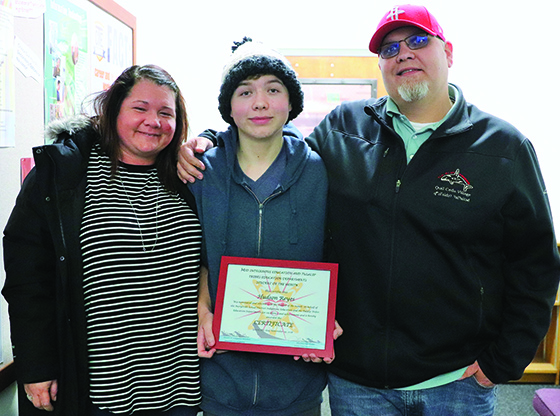
High school student of the month honors went to freshman Jaycynta, daughter of Lushootseed Teacher Michelle Myles. Heritage High School’s Acting Principal praised the 9th grader by sharing, “When I first met Jaycynta there were two things I noticed right away. First, she’s a super talented athlete, to the point when she’s playing her sports she is so intense and focused. But secondly, when she’s away from sports she’s super personable and kind. I was very happy to see this duality in her as a young woman. Jaycynta is a member of ASB and contributes to our Lushootseed weather program. She’s just amazing.”
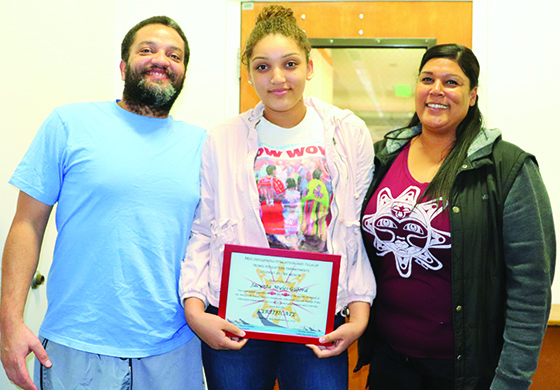
While receiving her award, the usually unassuming Jaycynta shared she aspires to be a pediatric anesthesiologist or neo-natal nurse. “I really want to study medicine and use that knowledge professionally to help children, especially our youngest ones who are in the most need,” she shared.
Going forward, a selection committee will review all student nominations based on their academics and school engagement. Each month three students (representing elementary, middle and high school levels) will be recognized as students of the month.
Reasons to Study Social Work
Jeanne Steffener, Tulalip Tribes Higher ED
Are you looking for a way to really help people? Social work is a career where you can find work that has real meaning, diversity, satisfaction in helping people discover options and solutions for dire, intense situations in their lives. Social workers help individuals, families and communities find positive solutions. It can also be a catalyst in helping to move social policy in the right direction.
The primary mission of the social work profession is to improve the well-being of all humans and to help them meet their basic needs while promoting social justice. Social justice includes making sure that people have equal opportunities, the ability to participate in decision making and providing basic needs to people while having opportunities to thrive as a member of society. These principles are applied as they work with everyone including the poor, the elderly, the disabled and importantly children, anyone who is vulnerable.
History shows us the importance of social work. Jane Addams, a pioneer in the social work effort and a Nobel Peace Prize winner, founded the Settlement House Movement in Chicago in the late 1800’s with the establishment of Hull House which flourished during the late 19th and early 20th centuries. Sadly, Hull House recently was forced to close due to diminished funding. Jane Adams understood the huge impact that social work had not only a singular person’s well-being but on society as a whole. Due to Jane and others following after her, the way has led to developing a social safety net for those at risk in our society.
According to the U.S. Census Bureau, nearly 15% of Americans live below the poverty line. People living in poverty need social workers to help them to cope with the overwhelming challenges of homelessness, unemployment, underemployment, and poor health and mental illness.
About 20% of the U.S. population suffers from some degree of mental illness. In this area, social workers are extremely important, helping to identify clinical services for those suffering from mood disorders, anxiety, psychoses, substance abuse and other serious forms of mental illness. In addition, social workers are the tireless advocates working to provide adequate mental health services, promote equality in health and mental health insurance coverage and confronting discrimination toward people with mental illness. In short, social workers become the support system as well as advocates for disadvantaged persons.
A degree in Social Work provides students with the ability to undertake a range of different professional roles. As situations are presented daily, social workers can find themselves in many different settings such as hospitals, homes or police departments. The skills developed through studying social work are valued by many employers in many different sectors of employment. These transferrable skills include communication, problem solving, empathy, team work and time management.
You are probably wondering where you would use your skills as a social worker. Social workers can be in many areas: public agencies, hospitals, police departments, courts, politics, human relations, non-profits, schools, nursing homes and private practice. According to the Bureau of Labor Statistics, “Overall employment of social workers is projected to grow around 16 % from 2016 to 2026, much faster than the average for all other occupations. Employment growth will be driven by increased demand for healthcare and social services, but will vary by specialization”.
If you like working with people, Social Work gives you an understanding of how to help people to function better in their environment. If this piques your interested in choosing a satisfying field of study, please call the Higher ED staff at 360-716-4888 or email us at highered@tulaliptribes-nsn.gov for assistance with this educational path.
